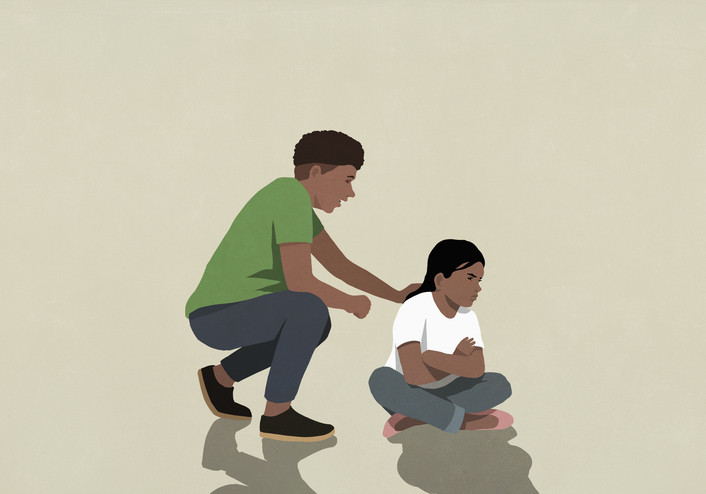Parenting isn't easy: Two important skills can help
Two important tools for parents trying to help their children navigate the sometimes troubled waters of emotions.
- Reviewed by Howard E. LeWine, MD, Chief Medical Editor, Harvard Health Publishing; Editorial Advisory Board Member, Harvard Health Publishing

They say that parenting is the greatest — and the most challenging — job that many of us will ever land. Life can be tough for kids too, especially when they go through emotionally trying times.
What can parents do to help their kids manage episodes of anger, sadness, or anxiety triggered by school, siblings, and daily living? Whether you are a parent to an elementary-age child, a tweener ages 8 to 12, or a teenager, practicing two skills can help both you and your child: validation and coping.
Practicing validation
Validation teaches your children that feeling and expressing their emotions is okay.
"When parents use validation, they are affirming to their child that it's fine to feel emotions and they should not be suppressed," says Dr. Chase Samsel with the Department of Psychiatry and Behavioral Sciences at Harvard-affiliated Boston Children's Hospital. "It shows them you understand their feelings and point of view, and it establishes trust. This, in turn, can help a child feel supported and open to discussing solutions."
Start with acknowledgement
Acknowledge their emotions with comments like, "It sounds like you are frustrated or angry," or "I can see that you've had a tough day at school."
But which emotion — or emotions — is your child feeling? "It can be difficult for parents to recognize the genuine emotion their child is battling," says Dr. Samsel. "Many times, kids have an emotional reaction but can't explain what's going on, or don't want to, or express various emotions at once."
Other times, different emotions lie underneath the one being shown. This is especially common among teenagers where they display anger, but often the real emotion is fear, anxiety, or sadness. "In these incidences, just recognizing they are going through something difficult is enough," says Dr. Samsel.
Practice validation often
A child may not respond to validation at first — they may not want to talk about their emotions or may ignore your interest. But consistent validation will eventually pay off.
"By repeating validation when emotional crises arise, the child soon will become more comfortable expressing their emotion," says Dr. Samsel. "Once they recognize that their parents welcome this and will not be reprimanded, they will be open to sharing details."
Building a coping skills toolbox
Coping skills are ways parents can teach their children to manage emotional problems when they arise.
Try a breathing exercise together
Breathing exercises are a popular strategy, as they are easy to learn and quick to use. Dr. Samsel recommends any of the following: three-part breathing, ujjayi breathing, and belly breathing.
Other coping skills include guided meditation, visualization, squeezing a ball for stress relief, taking a walk or playing outside, and reading together (ideal for preschool and elementary-age children).
"Sometimes just giving children alone time in their room or "taking space" works well," says Dr. Samsel.
Tap into coping skills yourself
It's also vital for parents to adopt these strategies when dealing with their own emotions, says Dr. Samsel. Not only will this help you feel calmer, but it's a great way to model that coping skills help everyone — adults, too!
For example, try telling your kids when you feel upset or frustrated about something that happens during your day. Announce that you plan to take a walk to de-stress or do a breathing exercise. Later, share your strategies for problem-solving.
"Kids watch what their parents do and will often mimic their behavior," says Dr. Samsel. "If they see you constructively working through your emotions, they will be more open to doing the same."
Be flexible
Never insist on having older kids use a coping mechanism, even when situations call for it. That could feel like punishment and trigger an automatic resistance.
Instead, Dr. Samsel suggests parents expose their children to different types of coping skills and then let them decide which ones they want to try. "They may need to experiment to find techniques they can easily follow and that work for them," says Dr. Samsel.
About the Author

Matthew Solan, Executive Editor, Harvard Men's Health Watch
About the Reviewer

Howard E. LeWine, MD, Chief Medical Editor, Harvard Health Publishing; Editorial Advisory Board Member, Harvard Health Publishing
Disclaimer:
As a service to our readers, Harvard Health Publishing provides access to our library of archived content. Please note the date of last review or update on all articles.
No content on this site, regardless of date, should ever be used as a substitute for direct medical advice from your doctor or other qualified clinician.















